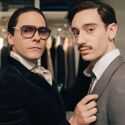 Playwright Dan Fishback covers a lot of territory in his humorous but highly provocative play, Waiting for Barbara: homophobia, privilege, power, racism — all rolled up and snorted through a 100 dollar bill.
Playwright Dan Fishback covers a lot of territory in his humorous but highly provocative play, Waiting for Barbara: homophobia, privilege, power, racism — all rolled up and snorted through a 100 dollar bill.
Set on the first night of the War in Iraq, two gay Yale seniors await the arrival of the President’s daughter to bring them to “an opening night war party.” While they wait, they drown their sorrows in cocaine and crystal meth, self-loathing and self-denial, and through their own twisted lenses, they envision what the war means for them and for America.
Fishback staged a reading at New York’s New Museum on the tenth anniversary of the start of the Iraq War, followed by a discussion of its themes. A few days later we had Dan analyze his own words to give us his unfiltered take on internal homophobia and gaycism in the LGBT community.
Warning: there’s some indelicate language ahead.
How about we take this to the next level?
Our newsletter is like a refreshing cocktail (or mocktail) of LGBTQ+ entertainment and pop culture, served up with a side of eye-candy.
Davenport: I never thought I’d feel this way, but it’s like: I’m really thinking about gay people all over the world, and how we’re going to save them from the Muslims.
Bryce: It’s our duty. It’s our duty as homosexuals to protect one another.
Queerty: Do you think the plight of gays in the Muslim world has improved since the start of the wars?
Fishback: Oh god, no. This is one of the big myths of Western imperialism – that war with Muslim countries will bring safety for women and queer people. In the decade since our invasion of Iraq, hundreds if not thousands of gay men and trans women in Iraq have been systematically hunted down, tortured and killed by anti-queer death squads. Some of the more gruesome torture involved cementing the anuses of the victims, and then force-feeding them laxatives so their intestines would explode. This was not happening under Saddam. So yeah, the War in Iraq has not been good for gay people, no.
And yet we still see this attitude that Americans should support violence against Muslim countries because those countries are homophobic. (As if America is not also homophobic and transphobic – as if trans people in our own country are not also systematically murdered.) You see it particularly in the discourse about Israel and Palestine, but if you talk to queer Palestinians, they all say that they will never see progress until the Occupation ends. So if you partially justify the subjugation of Palestine because it is a homophobic place, you’re also ignoring the actual wishes of real queer Palestinians who are begging for freedom. Recent writing by Sarah Schulman is particularly helpful to understand this process, especially her book, Israel/Palestine and the Queer International.
Davenport: Sam’s in love with you.
Bryce: Sam’s in love with Barbara!
Davenport: Sam is in love with power. Sam is in love with the power of being best friends with the First Daughter, and Sam is in love with the power of SUCKING YOUR PASTY-ASS BLUE-BLOOD YANKEE DICK.
Q: One of the most interesting themes of the play is “proximity to power,” particularly how homosexuals in those positions – closeted or not – forsake the LGBT community, e.g. Ken Mehlman. Can you speak to that a bit?
F: One of the worst culprits of this kind of betrayal is Christine Quinn. People support her because she’s a lesbian, but her actual policies are terrible for most queer people. She supported turning St. Vincent’s Hospital in the still-gay West Village into a luxury condo high rise, as if gay people need wealthy neighbors more than they need a hospital. She won’t pass paid sick leave, she’s supported our demonic Police Commissioner, the list goes on and on. But the thing is: queer people are everywhere. So when politicians like Quinn attack the poor, they attack the LGBT community. When they attack immigrants, they attack the LGBT community. When they attack people of color, they attack the LGBT community.
It happens over and over again – not just here, but in Western European countries too. When white homosexuals gain access to political power, they consolidate it by joining the white heterosexual elite in oppressing some “other” group – like immigrants, the poor, or people of color. This is being called “homonationalism,” which I think is a really helpful term, because it’s so widespread – the desperateness with which so many white homosexuals shit on whoever is beneath them in order to feel more secure in the power structure that, only a few years ago, would have eaten them alive.
Davenport: Jesus. Don’t get all Self-Loathing, Country Club Pity Poofter on me – it won’t work. I’m not going to feel sorry for you.
Bryce: I don’t want you to feel sorry for me.
Davenport: Good, cause I’m not going to…
Bryce: I don’t care what you think.
Davenport: Good, cause I think you’re a cry baby.
Bryce: I’m a faggot.
Davenport: Jeez. Give me a fucking break. You have no right to get like this.
Bryce: I have no right…to be sad, when [my] friend says horrid, horrid things about [me]?
Davenport: You have no idea.
Q: These characters are particularly vicious towards one another, but you said it wasn’t much of a stretch from conversations you’ve heard. Why do you think there’s so much internal homophobia among gay men?
F: Homophobia means fear of gay people, and who is more afraid of gay men than other gay men? There’s a great anthology by Mattilda Bernstein Sycamore called Why Are Faggots So Afraid of Faggots? which shines a light on this dynamic. We are so deeply oppressed, and so deeply fucked up as children. We retreat into our imaginations, we dissociate, we withdraw. As adults, we’re suddenly confronted with the reality of other human beings and so often we can’t get beyond those initial defense mechanisms. And because we’re still trapped in our defensive narcissism, so often gay men can’t understand that other people are real. So we lash out, we project, we see other people as reflections of ourselves and we destroy them because it’s easier than dealing with our own self-hatred and guilt. Just lurk in any gay bar late enough and you see this dynamic play itself out. It’s depressing and disgusting and it’s the result of systemic cultural homophobia.
Davenport: We can do anything we fucking want. I mean…that’s like… THAT’S, LIKE, THE POINT. That’s the point of this war. We’re fighting this war so we can do WHATEVER WE FUCKING WANT.
Q: After the play, talk turned to The New Normal and the sense that gay white males are somehow beyond racism. Why do you think that is?
F: So many white gay men seem to think that, because they are oppressed as homosexuals, they automatically understand ALL OPPRESSION, and are experts about all minority experiences, and therefore have a free pass to indulge in racist humor. “I’m gay,” they say, “so I couldn’t possibly be racist.” This is being called “gaycism,” which I think is a pretty helpful term. You also see it in white gay men’s attitudes towards women and trans people. Like, in another Ryan Murphy show, Glee, one character is a trans woman of color, but she barely ever says anything because the writers obviously know nothing about trans people. And yet they feel that they somehow own this experience because they are “LGBT,” and that T has got to mean something. But the truth is that being a cisgender homosexual teaches you ABSOLUTELY NOTHING about transgender experience until you get to know transgender people, or read books by transgender authors.
It all comes down to this: In my eyes, being queer can lead you down two different paths – it can make you sensitive to other oppression experiences or it can make you oblivious to them. It can make you humble or it can make you a dick. It can make you confront your own internalized racism, misogyny, transphobia and homophobia with dignity and a genuine concern to become a better person, or it can make you shut down to any implication that you are anything but a progressive gay saint. My hope is that more and more people use gay identity politics as a gateway drug to intersectionalism – so we can all tap into our revolutionary queer potential.
That’s the genius of being queer – we have the opportunity to inspect society from outside of it, to better understand how it’s broken. What concerns me – and what Waiting for Barbara is about – is that, so many homosexuals are missing that opportunity.


















ho
I really don’t know where to begin on this one so let’s just go with the simple truth
that g.w. bush was the worst president this country has ever seen.
viveutvivas
Pretty interesting interview.
A pity that much of it can’t be quoted here in the comments section because of the ridiculous filter.